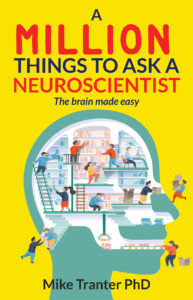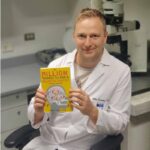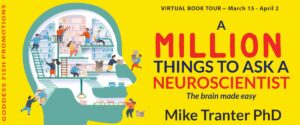 My special guest today is Dr Mike Tranter to talk about his new book, A Million Things To Ask A Neuroscientist – the brain made easy.
My special guest today is Dr Mike Tranter to talk about his new book, A Million Things To Ask A Neuroscientist – the brain made easy.
During his virtual book tour, Mike will be awarding a $20 Amazon or Barnes and Noble (winner’s choice) gift card to a lucky randomly drawn winner. To be entered for a chance to win, use the form below. To increase your chances of winning, feel free to visit his other tour stops and enter there, too!
Bio:
Dr Mike Tranter is from the North of England and studied how drugs work in our body, but it wasn’t long before he found his true calling as a neuroscientist. After a PhD in neuroscience, he spent years in research labs all over the world, studying how the brain works. Although, it is his prominent rise as a science communicator, opening up the world of neuroscience to everybody, that he enjoys the most.
Welcome, Mike. Please tell us about your current release.
I wanted to write a book that explains the brain in a way that everyone can enjoy it, regardless of scientific background, and not feel intimidated by any complicated science. To do this, I answer questions about the brain that were submitted by the general public. I answer things like; What is depression? How are memories encoded in the brain? Do men and women have different brains? What are dreams? I also guide people through some of the strange phenomena of the brain and the cutting-edge research that is happening today, which will shape the next 100 years of our lives. It also includes a chapter written by women, about women in STEM, and how they are working towards being a new generation of role models for future women scientists.
What inspired you to write this book?
People often say to me “Oh, neuroscience, that is too complicated for me, I will never understand that”. It simply is not true. Science is for everyone. I wanted to take away some of the fear behind learning neuroscience, and explain how our brain really works. I love being a scientist and studying how the brain works, and through this book, I have the opportunity to let people into this world, and give a behind-the-scenes look at research science in the brain. It is inspired by anyone who has ever wanted to embrace their curiosity and challenge themselves.
Excerpt from A Million Things To Ask A Neuroscientist:
Try thinking about dreams as if the brain is analysing our daily experiences without much logic. While you sleep, the visual cortex is very much awake. This part of our brain is busy processing the images from the day. Unrestrained, the brain can now think more abstractly and creatively, using imagery and metaphors to express ideas. This is why scenes and events are often exaggerated during our dreams, yet, we don’t notice the dream’s strangeness (as the logical part of the brain is sleeping). It is at the point of waking when we recognise how unusual things actually were.
What exciting story are you working on next?
I am taking the leap into fiction writing with my debut novel. It revolves around a character who travels the cosmos in the afterlife. He explores strange worlds and the laws of the universe, trying to understand the meaning of all life. A blend between philosophy, neuroscience, theology, and physics.
I have loved the scientific writing though, and so I will be co-authoring a book with a psychologist, where we explain what happens in the brain when things don’t quite work as expected.
When did you first consider yourself a writer?
To be honest, I think I will only consider myself a writer once the first book is sold. As this is my first book I have written, it feels as though I still need to make the leap from a scientist with an idea writing on his laptop, to a published author that (hopefully) inspires people to challenge themselves and learn more. Maybe when the reader gets a copy and enjoys it, that is when I will feel like a writer.
 Do you write full-time? If so, what’s your work day like? If not, what do you do other than write and how do you find time to write?
Do you write full-time? If so, what’s your work day like? If not, what do you do other than write and how do you find time to write?
I am a full-time research scientist working on understanding the brain, and so it can be difficult to find time to write. But as my work and my book are on the same subject, it does help a little. I try and wake up early to do some writing, and most evenings and weekends will also have dedicated time to write. It is a busy time, but it never feels like work because I enjoy my job, and writing a lot. So, it is worth it.
What would you say is your interesting writing quirk?
I have to write in an area that is organised and tidy. I have a writing desk, in a room in my apartment, so when I want to start writing, I need to make sure that the room, and desk is clean. It is something like, ‘a clean room, a clean mind’. I find that I can concentrate more when there is less clutter and distractions like that.
As a child, what did you want to be when you grew up?
I wanted to be a chef, or cook in a café for people. I used to like to pretend to make food when I was really young, and even today, I love cooking. I find time to try new recipes that I find, and my chopping skills are not bad. I don’t think I would enjoy it as a career though, it seems intense, and very hot in those kitchens. I prefer the relaxed home kitchen these days.
Anything additional you want to share with the readers?
I would just like to say Thank You to anyone who decides to read my book. By taking the time out of your day, to read what I have poured my heart into, it means a lot and I will never take things like that for granted.
Links:
Website | Instagram | Goodreads | Amazon
Thanks for being here today, Mike.

